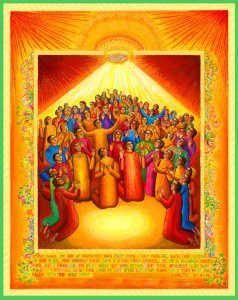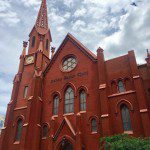
I know that extra room in a Manhattan apartment is unusual, so I’m well aware of how fortunate I am to live in a space with a little study that turns into a guest room.
Of late, this has been more of a guest room than a study. Several friends and a sister have visited this month, and I’ve spent hours showing my guests around my amazing neighborhood. On many of these beautiful Spring evenings my visitors and I have walked the several blocks where I live, and here is what we’ve seen and heard:
A little group of people in the park next door, radio tuned to a Latin beat, an older man playing a steel drum along to the music, another shaking a bright yellow maraca while bystanders sway and sing along in Spanish.
A little further down the street, on the corner, children chasing each other in the playground sprinklers, their mothers, wearing colorful hijabs, calling out in Arabic, cautioning care.
And just around the corner, in front of the hostel, a group of tourists standing on the sidewalk consulting a map, animatedly planning their day in the city…speaking German.
One more block up, on the next corner, men with yarmulkes streamed into a church, ready to worship in Hebrew on a Friday evening.
And another block down, two games of sidewalk checkers right next to each other, onlookers shouting out support for their player—in English, if you’re listening carefully.
This, I proudly tell my guests, is my little corner of New York. And unfailingly, every single one of them commented on those walks: “I’ve never heard so many languages in one place!”
You know, I hadn’t noticed. It’s just part of daily life for us, isn’t it? The maracas and the sprinklers and the tourists and all the different languages are just another day for us in the big city.
Because this is our reality, we might not be surprised to know that there are over 800 languages spoken in this city. That’s A LOT. Walking around Queens you might hear folks talking in Vlashki, a remote mountain dialect from Croatia. Or in the Bronx you could stumble into a church where Mass is said once a month in Garifuna, a language that comes from African slaves shipwrecked in the Caribbean. The only person in New York who speaks Mamuju, as far as he knows, is a man who lives in Queens but learned the language growing up in Indonesia. His wife can’t speak it; neither can his children. He only speaks it with his brother. On the telephone.
New York is the most linguistically diverse city in the entire world, “the capital of language density,” one scholar says. A 2010 New York Times article calls our city “a Babel in reverse.”
Thank goodness for even marginal biblical literacy, because we’ll immediately know when we hear that, that the author of that article is referencing the passage we heard this morning from Genesis 11, the story we know as the story of the Tower of Babel. Perhaps you felt as optimistic as I did when you heard the beginning phrase of the text: “Now the whole earth had one language and the same words.”
That sounds good to me, you know? Everybody getting along; business meetings short and sweet; all the people understanding each other…right?
With the same language and the same words, the text says, the people decided to build a tower that reached to the sky—something bigger than anyone had seen before, something that would make a name for themselves. With the optimism of uniformity and power, the people were sure that nothing they proposed to do was impossible.
But God…God did not feel optimistic when God saw what was going on, and as the tower went up, brick by brick, God came down and said: no. God scattered the people and mixed up their languages and sent them out all around the earth.
Why would Go do such a thing? Everybody was getting along and speaking the same language; everything seemed to be going so well! Building a tower, making a name for ourselves, making humanity great again.
But God is having none of that at all. We might imagine God looking down at our frantic human striving and sighing with exasperation. “No! This is not what I intended when I spun the world into existence and created the teeming life and vast seas and so much diverse and beautiful variety! Do not limit the possibility and promise of my creation by imposing your shot-sighted uniformity.”
Because God knew, even if we forget again and again, that only one language, one expression, one color is too atonal for the work of God in the world. With conformity and uniformity, what happens? The culture that emerges is not the blissful Pleasantville we imagine, but rather a one-note refrain of domination and greed, where we wear identical uniforms and wave our flags and march in lockstep…where our life together celebrates only power, arrogance, self-adulation, and privilege.
And that is nothing like what God imagines for human community—no building the biggest and speaking the same and looking identical. No.
It should not go unnoticed today that we tell the story of God’s holy confusion at the Tower of Babel from the nave of The Riverside Church, the tallest church in America, one of the richest countries on this planet.
And how shall we grapple with the reality that Church in America, organized Christianity, has come to represent many things antithetical to the way of God? That 81% of white evangelicals in this country claimed the self-righteous piety of their faith when they cast their votes for racism, misogyny, the trampling of the poor and the false conformity that represents privilege?
What are we, people of faith on the birthday of the Church, to do with this?
Rather than claiming this edifice as a monument to conformity, or participating in any way with voices claiming the “right” or even “Christian” way of doing things, perhaps from this tower we commit again to doing what seems impossible: welcoming the wild and holy work of God’s Spirit here among us, and in our world…speaking forth a new reality as we resist the efforts of the powerful to reduce our religion, our country, our humanity, to nothing more than the repeating refrain dominance—not unity.
Today, of course, is the perfect day to commit ourselves again to this work, because it’s Pentecost Sunday. On Pentecost Sunday we celebrate “the birthday of the Church,” and we tell the tale of scared disciples visited by doves and fire, empowered to speak in a cacophony of languages so that everyone—everyone in the vast crowd—would hear her own, would understand, would be invited into the work of God in the world.
On Pentecost, God shows up to create unity through diversity, where what sounds at first like chaos and confusion is woven together to create a revolutionary human community where everyone can hear a message of love and grace and truth and justice, and where the lively Spirit of God beckons us to join God’s work in the world, where nothing we propose to do will be impossible.
On the day of Pentecost, Jerusalem was filled with people from all over—the text says “Jews from every nation under heaven.”
Many of them were visiting Jerusalem because it was Shavuot, the Jewish Festival of Weeks, and devout Jews were required by Jewish law to come to Jerusalem to celebrate.
But not everybody there was Jewish, because it was also a holiday in the way that holidays bring families and celebrations, travel and obligation into our lives, and lots of worshippers, merchants, and travelers joined the regular population of Jerusalem to celebrate the holiday. And right along with them were the disciples, waiting like Jesus said, for power from on high.
And then it came.
The overpowering sound of a rushing wind filled the house, slamming doors, flapping shutters, blowing around so hard that they had to cover their ears it was so loud. And fire…fire came down and rested on each one of them, a flame the text says. And they were filled with the Spirit, and everybody started talking in other languages. All of the sudden, what they’d been waiting for had arrived, and everybody there, all of the people visiting the city, all of the foreigners providing services, all of them heard a message of transformational power in their very own languages.
And once again, God showed up to remind us that conformity and structure, safety and ease are not the way of God in the world. Instead, God’s Spirit insists on diversity, difference, maracas and yarmulkes and the voices of children and neighbors calling out, “as-salaam ‘alaykum” as you pass on the sidewalk.
When we propose to build walls that keep people out of the utopia we foolishly imagine, empowered by the Spirit of Pentecost, the Church will resist.
When we hear, “You’re in America now, learn to speak English,” empowered by the Spirit of Pentecost, the Church will resist.
When in arrogance we step away from the shared work of caring for the earth because we short-sightedly prefer to maximize our wealth at the expense of the planet’s future, empowered by the Spirit of Pentecost, the Church will resist.
When hate-filled rhetoric fueled by fear and evil turns to violence…at concerts, on train rides, spray painted on prominent homes, in the heart of our cities, empowered by the Spirit of Pentecost, the Church will resist.
Why will the Church resist? Because if we learned anything at Babel…or on Pentecost, we learned that God perpetually invites us, not to conform, but to listen. To learn to listen to the beautiful cacophony around us…to welcome the work of God’s Spirit…to live out the lively diversity that God envisioned when God first spun the world into being.
I have to warn you, though. Living into the promise of Pentecost is hard work. It takes discipline to listen for more than the one note, one language, one ideology with which we feel comfortable.
Welcoming God’s Spirit will feel disorienting and unsettling. When we listen for God, we will hear the unfamiliar, the exotic, the new.
But it seems like today, the birthday of the Church and the Day of Pentecost, is just the day to remember that all the comfort of uniformity is not the way of God. Our human structures of order, dominance, hierarchy can’t possibly express the holy, uncontained, creative presence of God’s Spirit in the world…and it is our work as the Church, to learn to listen instead for God in the beautiful, holy expression all around us.
Learn to listen: for justice.
Learn to listen: for grace.
Learn to listen: for peace.
Learn to listen: for love.
Learn to listen, Church. Because when we do, nothing we propose together will be impossible.
May it be so.
Amen.












